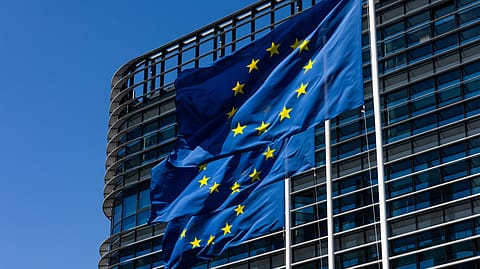US-EU move closer on further sanctions on Russia, secondary sanctions on nations buying Russian oil, say reports
This comes just a day after U.S. Treasury Secretary Scott Bessent’s remarks on the US and EU imposing sanctions on Russia. Bessent had said that, following such a joint action, the Russian economy would 'collapse.'

The European Union (EU) is reportedly discussing on imposing additional sanctions on Russia with the U.S., as both the U.S. and the EU seek to resolve the Ukraine crisis.
This comes just a day after U.S. Treasury Secretary Scott Bessent’s remarks on the US and EU imposing sanctions on Russia. Bessent had said that, following such a joint action, the Russian economy would 'collapse.'
The European Commission confirmed that the Union’s sanctions envoy David O'Sullivan with his team of experts were in talks with their U.S. counterparts to discuss further sanctions against Russia, as both partners work to limit Russia’s ability to mount its strikes and attacks on neighbouring Ukraine.
U.S. president Donald Trump has repeatedly said that he is ready to impose further sanctions against Russia, to end the latter’s war in Ukraine.
European Council president António Costa had reportedly said that the EU and U.S. are aligning efforts to make sanctions more effective and to pressure President Putin into peace talks with Volodymyr Zelenskyy. Costa also has called for tougher measures, including secondary sanctions on countries purchasing Russian gas and oil.
According to media reports, a German spokesperson confirmed Europe’s agreement with the U.S. to impose further sanctions against Russia. In a joint initiative, France and Germany have proposed new sanctions aimed at curbing Russia’s energy revenues, including blacklisting non-sanctioned oil companies such as privately owned Lukoil and targeting foreign refineries that re-export Russian oil to the EU.
Since the commencement of the Russia-Ukraine war, the EU has approved 18 rounds of sanctions, and the recent talks signal more measures are expected soon. The most recent sanctions were agreed in July, that entailed lowering the price cap on Russian oil, closing loopholes to curb trade in Russian petroleum products, and banned vessels carrying Russian energy from European ports.
Recommended Stories
The U.S. administration has already imposed 50% tariffs Indian goods exported to the U.S., in the wake of India’s purchase of discounted Russian oil.
Reports claim that EU may find it difficult to impose secondary sanctions on countries such as India as the former seeks to strengthen its bilateral ties with these third countries amid global uncertainty.